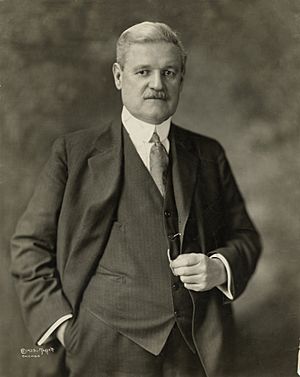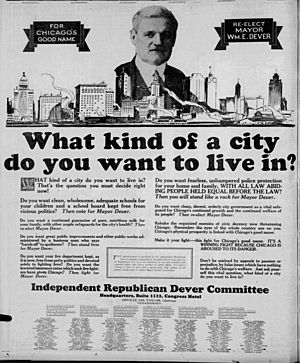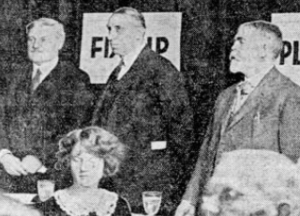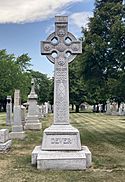William Emmett Dever facts for kids
Quick facts for kids
William Emmett Dever
|
|
|---|---|
 |
|
| 42nd Mayor of Chicago | |
| In office April 16, 1923 – April 18, 1927 |
|
| Preceded by | William Hale Thompson |
| Succeeded by | William Hale Thompson |
| Justice of Illinois' First District Appellate Court | |
| In office 1916–1923 |
|
| Justice of the Superior Court of Cook County | |
| In office 1910–1916 |
|
| Alderman of the Chicago City Council | |
| In office 1902–1910 Serving with Lewis D. Sitts
|
|
| Preceded by | Frank Oberndorf |
| Succeeded by | Stanley S. Walkowiak |
| Constituency | 17th ward |
| Personal details | |
| Born | March 13, 1862 Woburn, Massachusetts |
| Died | September 3, 1929 (aged 67) Chicago, Illinois |
| Political party | Democratic |
| Spouse | Katherine Conway Dever |
| Residences | Chicago, Illinois |
William Emmett Dever (March 13, 1862 – September 3, 1929) was the mayor of Chicago from 1923 to 1927. Before becoming mayor, he served as a judge and an alderman. As an alderman and judge, he worked for over two decades to become the Democratic candidate for mayor.
Born in Massachusetts, William Dever moved to Chicago as a young adult. He became an alderman and strongly supported the city owning public transportation. He was part of the Dunne group within the local Democratic party.
As mayor, he focused on improving the city and its buildings. He also worked to enforce Prohibition, which was a law against alcohol, even though he didn't personally agree with it. At first, this enforcement worked well. However, other government levels didn't help much, and less alcohol led to more violence among people selling illegal alcohol. This made Chicagoans dislike Prohibition. He lost to William Hale Thompson in the 1927 election because of this issue. He was the last Democratic candidate to lose a partisan Chicago mayoral election. He wasn't always in good health and retired from politics after the election. He passed away two years later from pancreatic cancer.
Contents
Early Life and Education
William Dever was born in Woburn, Massachusetts. When he was fifteen, he started working in his family's leather tanning business. In 1882, he left Woburn and moved to Boston. For two years, he traveled for the tannery business while based in Boston.
During this time, Dever met Katherine E. Conway, and they got married in 1885. They later adopted two sons. When Kate saw an advertisement saying that leather tanners could earn good money in Chicago, the couple decided to move west.
After arriving in Chicago in 1887, Dever found a job at a leather tannery on Goose Island. He also started taking law classes at night at the Chicago College of Law. After graduating in 1890, Dever opened his own law practice.
Becoming an Alderman
Dever first ran for alderman in 1900 but was not elected. He was encouraged by Graham Taylor to run again. In 1902, he was elected alderman for the 17th Ward.
Dever was elected because he strongly supported the city owning its streetcar services. This was a big issue during the Chicago Traction Wars. He continued to support this idea throughout his time as an alderman and later as mayor.
People saw Dever as an "honest" alderman. He had a good voting record and was often supported by the Municipal Voters League when he ran for re-election.
Dever became one of the most important aldermen during the first time Carter Harrison Jr. was mayor. Dever was considered a possible Democratic candidate for mayor in 1905, but he chose not to run. He became a key supporter of Mayor Edward Fitzsimmons Dunne, who was elected in 1905 and also favored city ownership of public services. Even though he was connected to Dunne's group, Dever got along well with other groups in the Democratic Party.
In 1906, Dever had a tough re-election race. He had voted to raise fees for saloon licenses. In response, saloons in his ward raised beer prices and told customers it was because of a "Dever tax." However, Dever campaigned actively and had strong support from Mayor Dunne, which helped him win re-election easily.
Judicial Career
In 1910, Roger Sullivan, a Democratic party leader, convinced Dever to run for a judge position on the Superior Court of Cook County. Dever had been thinking about running for mayor in the 1911 Chicago mayoral election, but he agreed to become a judge instead. He was elected and then left the City Council to start his new role as a judge.
Dever chose not to run for mayor in 1915.
In 1916, Dever had only three weeks to campaign for re-election as a judge. This was because a long trial he was overseeing had just finished. Despite the short time, he won easily.
A few months into his second term as a Cook County Superior Court judge, Dever was appointed to fill an open spot on the Appellate Court. He served two partial terms on this court and eventually became its main judge. For his second term, he was re-elected with more than 98,000 votes.
Dever was initially assigned the case against those involved in the Black Sox Scandal. This was a famous baseball scandal. The first court hearing began in February 1921. In March 1921, Dever did not allow the lawyers to delay the case forever. He set a quick trial date. Because of this, the Cook County state's attorney, Robert E. Crowe, decided to drop the charges for a moment. He planned to present the case to a grand jury again for new charges. This would give him more time to gather evidence. The new trial then went to judge Hugo Friend.
Mayor of Chicago
1923 Mayoral Election
In 1923, Democratic party boss George E. Brennan believed Dever had the best chance to defeat the current mayor, William "Big Bill" Thompson. Dever ran on a platform of making reforms and improvements. Thompson then left the race, and the Republicans chose Arthur C. Lueder instead. Dever easily defeated Lueder.
What Mayor Dever Did
Dever became mayor on April 16, 1923.
Improving Public Transit
Early in his time as mayor, Dever started making plans to improve the city's public transportation. This was a key promise during his election campaign. He had long supported the city owning public transport, a big topic during the Chicago Traction Wars. Dever began talks to buy the Chicago Surface Lines and the Chicago Rapid Transit Company, so they would be owned and run by the city. He also started planning for new transit lines and building a subway system.
City Improvements
During Dever's time in office, many improvements were made to the city's buildings and roads. These included finishing Wacker Drive, extending Ogden Avenue, straightening the Chicago River, and building the city's first airport, Municipal Airport.
Schools and Education
As mayor, Dever generally allowed the Chicago Board of Education to work without political interference. This was different from the previous mayor, William Hale Thompson, whose time in office had seen schools affected by politics and fraud.
Early in his mayoralty, Dever appointed seven new members to the Chicago Board of Education. This new board, shaped by Dever, looked for a superintendent who would make the education office stronger, reduce wasted money, and improve educational standards. On January 9, 1924, the board voted to appoint William McAndrew as the superintendent of Chicago Public Schools.
On December 5, 1926, Mayor Dever surprisingly got involved in a school board disagreement. He agreed with Alderman Leo M. Brieske that it would be better to replace McAndrew with a new superintendent. Dever said he believed the superintendent should be from Chicago. He stated, "I strongly agree with Alderman Brieske that Chicagoans should fill Chicago offices. We have many capable people here, without bringing in outsiders." However, McAndrew remained superintendent.
1927 Mayoral Election

Dever ran for re-election in 1927 against "Big Bill" Thompson. Thompson defeated him by 83,000 votes.
Dever's term as mayor ended on April 18, 1927.
Later Years
After being mayor, Dever became a vice-president at a local bank. However, he took time off due to his health and passed away from cancer in 1929. He is buried in Calvary Cemetery in Evanston, Illinois.
 | Calvin Brent |
 | Walter T. Bailey |
 | Martha Cassell Thompson |
 | Alberta Jeannette Cassell |



